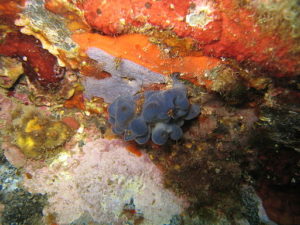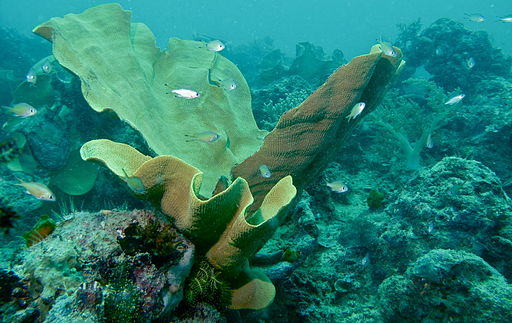
Image: Blue-violet Oscarelle (Oscarella lobularis) and blue encrusting sponge (Phorbas tenacior) in the Mediterranean Sea near Banyuls. Follow the link to see the annotations to this photo by Matthieu Sontag, Licence CC-BY-SA, Wikimedia Commons.
Charles Darwin noted that coral reefs thrive in what appears to be a nutritionless environment. This observation has been called “Darwin’s Paradox.”
In 2013, scientists from the University of Amsterdam conducted research to identify whether sponges played a significant role in the sustainability of coral reefs. The research team found that more than just playing a part, the coral reef depended on sponges for its ability to thrive.
The mystery of how coral reefs thrive in “ocean deserts” has been solved, scientists say.
Reefs are among Earth’s most vibrant ecosystems, yet they flourish in waters lacking nutrients – a phenomenon known as Darwin’s Paradox.
A team found that sponges keep the reef alive – by recycling vast amounts of organic matter to feed snails, crabs and other creatures.
Writing in Science, they hope their findings will aid conservation.
Sponges recycle nearly ten times as much matter as bacteria, and produce as much nutrition as all the corals and algae in a reef combined, the scientists calculate.
They are the “unsung heroes” of the reef community, said lead author Jasper de Goeij, an aquatic ecologist at the University of Amsterdam.
“Up until now no-one has really paid sponges much attention. They look nice, but everybody was more interested in corals and fish,” he told BBC News.
“But it turns out that sponges are big players – and they deserve credit for their role.
“If you want a reef which is colourful and biodiverse, you need a ‘sponge loop’ to maintain it.”
It was during his voyage on the Beagle that Charles Darwin famously observed that tropical reefs are like oases in a desert. They are surrounded by waters lacking nitrogen and phosphorus – the building blocks of life – which ought to prohibit their growth.
And since corals release up to half their organic matter into seawater, reefs need a system to recover these nutrients and recycle them into the ecosystem.
Bacteria do part of the job, but are not abundant enough to service the chemical dependencies of a whole teeming reef community.
To see how the sponges provide the critical nutrient system, and see the steps taken by the University of Amsterdam scientists to follow this process, visit the source article at www.bbc.com.
Alternatively, visit the next page to see a dramatic video demonstrating how the sponge recycles coral sugars and makes food available to other reef inhabitants, and then read, on page 3, about a follow-up study conducted in 2015 by the University of Amsterdam, in deeper waters.

